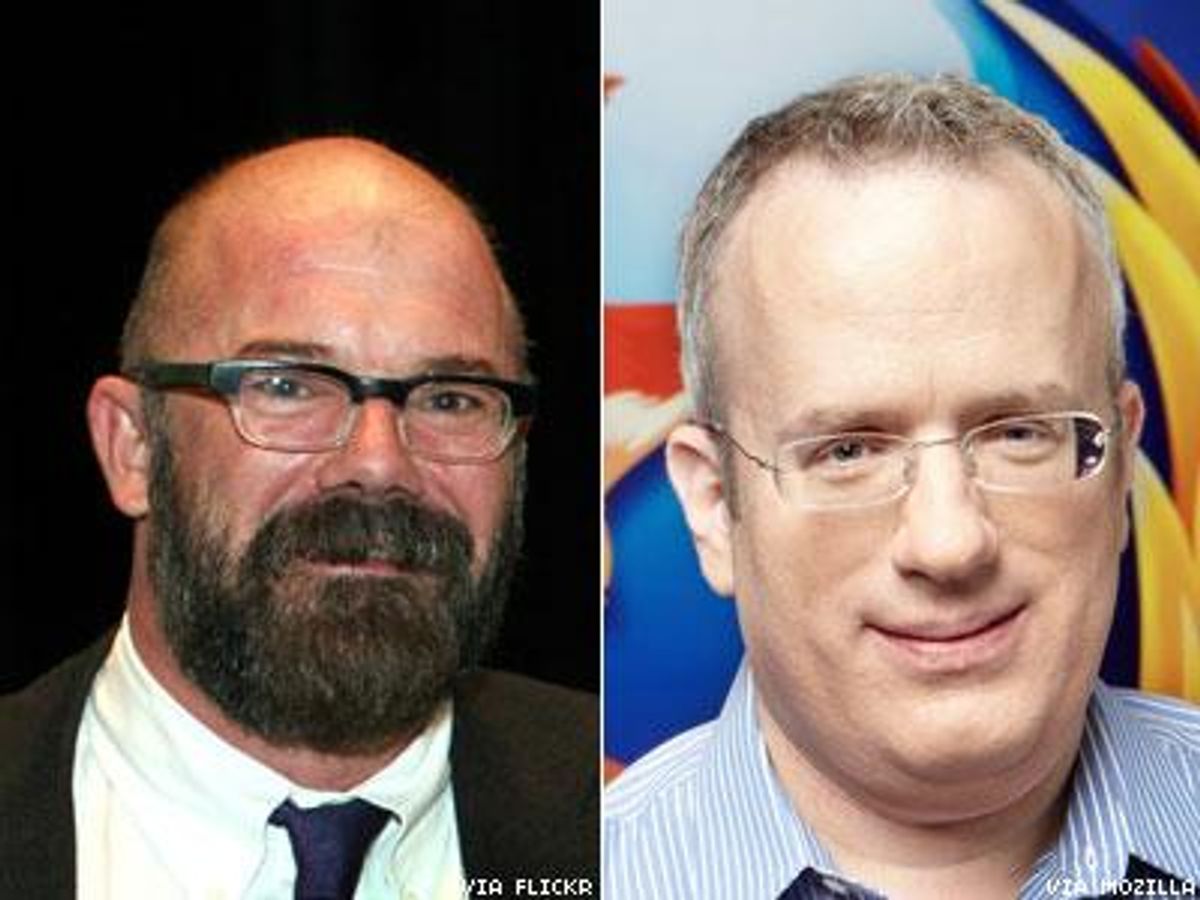After just 10 days in the position, JavaScript inventor Brendan Eich resigned as Mozilla's CEO Thursday amid outrage over his past donations to antigay politicians and causes.
But did activists -- including more than 70,000 people who signed a petition at CredoAction demanding Eich denounce his antigay donations or resign -- go too far in demanding the removal of an experienced technology executive who made private donations to antigay efforts nearly a decade ago?
In the wake of Eich's ouster, LGBT pundits from across the spectrum are weighing in on precisely that question.
Andrew Sullivan, the gay blogger and outspoken marriage equality supporter who has sometimes taken conservative stances, was quick to denounce Eich's ouster as a move that "disgusts" him, insisting that it should similarly repulse "anyone interested in a tolerant and diverse society."
"If this is the gay rights movement today -- hounding our opponents with a fanaticism more like the religious right than anyone else -- then count me out," continued Sullivan in a post published Wednesday evening at his site The Dish. "If we are about intimidating the free speech of others, we are no better than the anti-gay bullies who came before us."
But fellow gay pundit and SiriusXM radio host Michelangelo Signorile vehemently disagreed, arguing that it wasn't just Eich's $1,000 donation to help pass Proposition 8 -- which revoked marriage equality in California -- that led Mozilla to pressure its newly minted CEO to step down.
In his Huffington Post op-ed titled "Dear Andrew Sulivan: 'Left-Liberal Intolerance' Did Not Bring Down Mozilla's CEO," Signorile noted that in the final hours of Eich's tenure as CEO, U.K. newspaper The Guardian had revealed that Eich donated to radical right-wing candidate Pat Buchanan and marriage equality opponent Ron Paul in the 1990s.
"Eich only announced he was stepping down after it was revealed late Wednesday that he'd given money to Pat Buchanan's presidential campaign in 1992, and later to Ron Paul's campaign," wrote Signorile. "Suddenly, in addition to defending a CEO who gave money to homophobic efforts, Mozilla would have to defend a CEO who supported Buchanan, a far right extremist and isolationist who's been accused of racist and anti-Semitic attacks, and who also was, rightly, driven off MSNBC."
Indeed, while it's tempting to paint Eich's removal as the successful result of a mobilization campaign by the gay rights movement, TheNew York Times noted that Mozilla is not the average Silicon Valley tech company.
"Mozilla is not a normal company," explained Farhad Majoo in a Friday post at the Times' tech blog, Bits. "It is an activist organization. Mozilla's primary mission isn't to make money but to spread open-source code across the globe in the eventual hope of promoting 'the development of the Internet as a public resource.' As such, Mozilla operates according to a different calculus from most of the rest of corporate America."
In Mozilla's own blog post confirming Eich's resignation, the Mozilla Foundation's executive chairwoman, Mitchell Baker, acknowledged that the organization had failed to meet its own stringently progressive standards.
"Mozilla prides itself on being held to a different standard and, this past week, we didn't live up to it," began Baker's genuine mea culpa on behalf of Mozilla executives. "We know why people are hurt and angry, and they are right: it's because we haven't stayed true to ourselves. We didn't act like you'd expect Mozilla to act. We didn't move fast enough to engage with people once the controversy started. We're sorry. We must do better."
"Mozilla believes both in equality and freedom of speech," continued Baker. "Equality is necessary for meaningful speech. And you need free speech to fight for equality. Figuring out how to stand for both at the same time can be hard... We have employees with a wide diversity of views. Our culture of openness extends to encouraging staff and community to share their beliefs and opinions in public. This is meant to distinguish Mozilla from most organizations and hold us to a higher standard. But this time we failed to listen, to engage, and to be guided by our community. While painful, the events of the last week show exactly why we need the web. So all of us can engage freely in the tough conversations we need to make the world better."
Even the gay coders who launched a personal boycott of Mozilla that led to a wider controversy -- including online dating site OKCupid briefly encouraging users accessing the site through Mozilla's Web browser, Firefox, to switch to another program because of Eich's antigay beliefs -- called Eich's ouster "a sad victory." The coders, who are a married couple, also commended Mozilla's heartfelt statement
"We never expected this to get as big as it has and we never expected that Brendan wouldn't make a simple statement," wrote Hampton and Michael Catlin in a Thursday blog post for their tech company Rarebit. "I met with Brendan and asked him to just apologize for the discrimination under the law that we faced. He can still keep his personal beliefs, but I wanted him to recognize that we faced real issues with immigration and say that he never intended to cause people problems. It's heartbreaking to us that he was unwilling to say even that."
The Catlins stressed that they were never upset about Eich's past support of the Prop. 8 campaign, citing his right to hold personal opinions -- even those unpopular in the largely progressive tech industry. "Instead we were more upset with his current and continued unwillingness to discuss the issue with empathy," they wrote. "Seriously, we assumed that he would reconsider his thoughts on the impact of the law (not his personal beliefs), issue an apology, and then he'd go on to be a great CEO."
While some see Mozilla as unusual organization in its drive to adhere to progressive ideals of open source, free exchange of information, and inclusion and equality for all, an analysis by Nate Silver, the gay statistician and founder of the blog FiveThirtyEight, reveals that such ideals are par for the course in tech-saturated Silicon Valley.
In a Friday post, Silver pointed out that a vast majority of Northern California tech companies ranked among the Fortune 500 -- including Google, Apple, Hewlett-Packard, Sun Microsystems, eBay, Yahoo, and more -- had employees who opposed Prop. 8 in 2008.
"In total between these 11 companies, 83 percent of employee donations were in opposition to Proposition 8," explained Silver. "So Eich was in a 17 percent minority relative to the top companies in Silicon Valley." Silver also notes that only four donors listed their employer as Mozilla, and of those, Eich was the sole donor to the Yes on 8 campaign.
"However, there was quite a bit of variation from business to business," Silver wrote. At Intel, 60 percent of employee donations were in support of Proposition 8. By contrast, at Apple, 94 percent of employee donations were made in opposition to Proposition 8. The opposition was even higher at Google, where 96 percent of employee donations were against it, including $100,000 from co-founder Sergey Brin."
Ultimately, Slate's Will Oremus argued that support for marriage equality is, at present, a reasonable litmus test for the head of a major corporation -- especially one in the left-leaning tech community.
"Opposing gay marriage in America today is not akin to opposing tax hikes or even the war in Afghanistan," wrote Oremus Thursday. "It's more akin to opposing interracial marriage: It bespeaks a conviction that some people do not deserve the same basic rights as others. An organization like Mozilla might tolerate that in an underling, and it might even tolerate it in a CTO. But in a CEO -- the ultimate decision-maker and public face of an organization -- it sends an awful message. That's doubly so for an organization devoted to openness and freedom on the Web -- not to mention one with numerous gay employees."




















































































